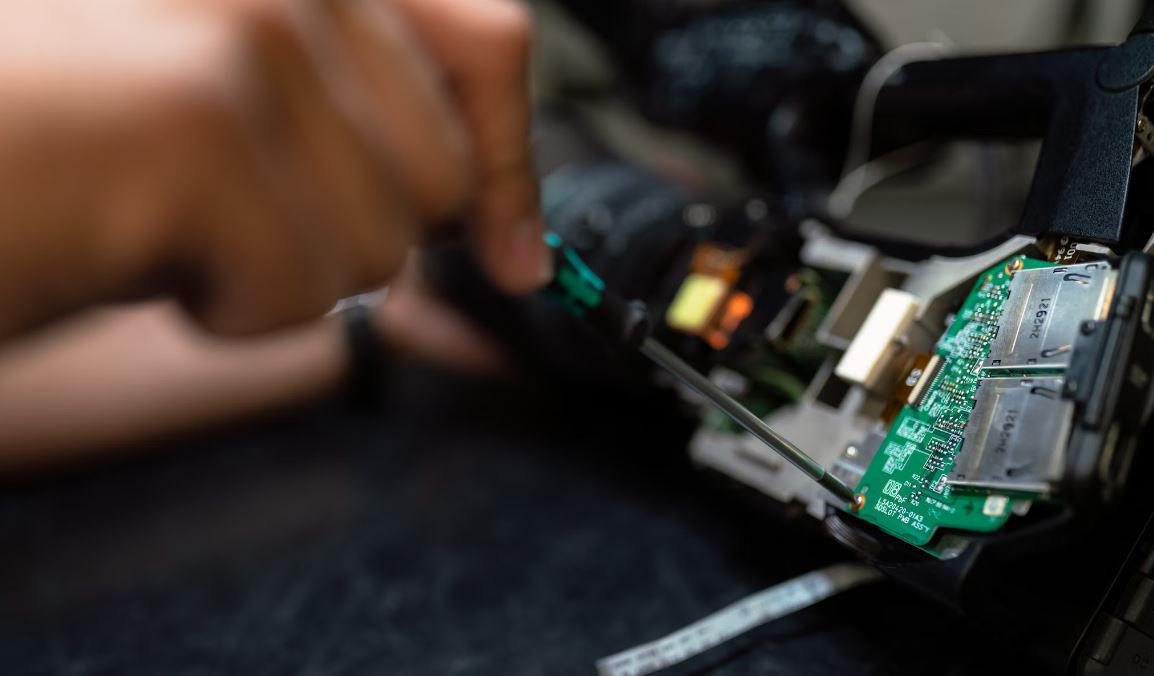Podcast Editing
Podcasts have become a popular form of content consumption, allowing individuals to listen to their favorite shows on-the-go. However, producing a professional-sounding podcast requires more than just recording the audio. Podcast editing is an essential step in the production process that ensures the final product is polished and engaging for the listeners.
Key Takeaways
- Podcast editing is crucial for enhancing the overall quality of the audio.
- Proper editing can remove mistakes, improve pacing, and create a seamless listening experience.
- Investing in good editing software and tools can streamline the editing process.
- Professional podcast editors often provide specialized services to help podcasters achieve their desired sound.
Effective podcast editing involves various techniques and considerations. **First**, it is important to start with good raw audio. This means recording in a quiet environment using high-quality equipment to capture clear sound. **Trimming** is one of the basic editing tasks, which involves removing any unnecessary sections of the recording such as long pauses, mistakes, or tangents. *By doing so, the podcast episode becomes more concise and focused.*
**Second**, adjusting the **volume levels** is crucial to ensure consistent audio quality throughout the podcast. This involves normalizing the volume to avoid abrupt changes that may annoy listeners. Furthermore, **equalization** helps balance the frequencies, enhancing the clarity and richness of voices. *With proper equalization, the podcast hosts’ voices can truly shine.*
**Third**, adding **music and sound effects** can greatly enhance the listener’s experience. Intros, outros, background music, and transitional sound effects can create a professional and engaging atmosphere. *By carefully choosing appropriate music and effects, podcast episodes become more immersive and memorable.*
The Role of Podcast Editing Software
Podcast editing software provides essential tools and features to streamline the editing process. These tools can make editing faster, easier, and more efficient. **Some popular podcast editing software includes:**
| Software | Features |
|---|---|
| Audacity |
|
| Adobe Audition |
|
Podcast Editing Services
For podcasters who don’t have the time or expertise to edit their own episodes, professional podcast editing services offer valuable assistance. These services can help refine the sound quality, remove unwanted noise, perfect timing and pacing, and add professional touches. **Some benefits of utilizing podcast editing services include:**
- Saving time and effort by delegating the editing task to professionals.
- Accessing specialized expertise to enhance the overall audio quality.
- Receiving personalized feedback and suggestions on how to improve the podcast.
Conclusion
Podcast editing plays a crucial role in delivering high-quality content to listeners. With the right software and techniques, podcasters can improve the overall sound quality, create engaging listening experiences, and elevate their podcasts to new heights. Whether editing episodes themselves or outsourcing to professionals, investing time and effort into podcast editing is always worth it.

Common Misconceptions
About Podcast Editing
There are several common misconceptions surrounding the topic of podcast editing. These misconceptions can lead to misunderstandings and false expectations. It is important to debunk these myths in order to have an accurate understanding of podcast editing.
One common misconception is that podcast editing is a quick and easy task. In reality, editing a podcast requires a significant amount of time and effort. It involves listening to the audio, removing background noise, balancing the audio levels, and editing out mistakes or awkward pauses. This meticulous process takes time and skill.
- Podcast editing is a time-consuming task that requires attention to detail.
- Editing involves removing background noise and balancing audio levels.
- Editors need to edit out mistakes and awkward pauses.
Another misconception is that anyone can edit a podcast without professional training or experience. While it is true that anyone can attempt to edit a podcast, having the necessary skills and knowledge is crucial for a high-quality result. Professional podcast editors have expertise in audio editing software, understand audio engineering principles, and have a keen ear for detail.
- Professional training is essential for producing a high-quality podcast.
- Expertise in audio editing software is necessary for effective podcast editing.
- Audio engineering principles are important for producing professional-grade audio.
Some people believe that investing in podcast editing is unnecessary and that raw recordings can be published as they are. However, podcast editing plays a vital role in enhancing the overall listening experience. It eliminates distractions, ensures a smooth flow of content, and makes the podcast sound professional and polished.
- Podcast editing enhances the overall listening experience.
- Editing ensures a smooth flow of content.
- A well-edited podcast sounds professional and polished.
Another misconception is that podcast editing is only about cutting out mistakes and errors. While editing does involve removing errors and enhancing the audio quality, it also involves structuring the content, adding transitions, and blending different audio elements together. By doing so, podcast editors create a cohesive and engaging narrative that keeps listeners hooked.
- Editing involves structuring and organizing podcast content.
- Transitions and audio blending enhance the overall flow of the podcast.
- Podcast editing creates a cohesive and engaging narrative.
Lastly, some people believe that podcast editing is an unnecessary expense that can be skipped. However, investing in professional podcast editing can significantly improve the quality and impact of your podcast. It can help attract and retain listeners, increase production value, and set your podcast apart from the competition.
- Professional editing can attract and retain more listeners.
- Investing in editing improves production value.
- Quality editing sets your podcast apart from competitors.

Introduction
In the world of podcasting, the process of editing plays a crucial role in delivering high-quality audio content to the listeners. Effective editing enhances the overall listening experience by removing any unwanted noises, improving clarity, and creating a smooth flow. This article explores various aspects of podcast editing, including common editing software, the average time spent editing per episode, popular editing techniques, and more.
Podcast Editing Software Comparison
This table provides a comparison of popular podcast editing software, showcasing their key features and compatibility.
| Software | Price | Features | Compatibility |
|---|---|---|---|
| Adobe Audition | $20.99/month | Advanced multitrack editing, effects, noise reduction | Windows, macOS |
| GarageBand | Free | Simple editing, pre-loaded sound effects, royalty-free music | macOS, iOS |
| Audacity | Free | Easy editing, noise reduction, various plugins | Windows, macOS, Linux |
Average Time Spent Editing per Episode
This table illustrates the average time podcasters dedicate to editing a single episode, indicating the level of effort invested in refining their content.
| Podcast Genre | Average Time (minutes) |
|---|---|
| Comedy | 45 |
| True Crime | 75 |
| Business | 60 |
Common Podcast Editing Techniques
This table showcases various editing techniques employed by podcast editors to improve the quality and engagement of their episodes.
| Technique | Description |
|---|---|
| EQ Adjustment | Enhancing or reducing specific audio frequencies to optimize clarity and balance |
| Noise Reduction | Eliminating background noise, clicks, or hisses to improve clean sound |
| Gap Removal | Removing unwanted silences or awkward gaps in conversations |
Podcast Listener Demographics
This table presents an overview of podcast listener demographics, shedding light on their age groups and listening preferences.
| Age Group | Percentage of Listeners | Preferred Genre |
|---|---|---|
| 18-24 | 15% | Comedy |
| 25-34 | 35% | True Crime |
| 35-44 | 20% | News & Politics |
Impact of Sound Quality on Listener Retention
This table examines the correlation between sound quality and listener retention, showcasing the percentage of listeners who stop listening due to poor audio.
| Sound Quality Rating | Percentage of Listeners Who Stop Listening |
|---|---|
| Excellent | 5% |
| Good | 15% |
| Fair | 30% |
Podcast Downloads vs. Listens
This table compares the number of podcast downloads to the number of actual listens, highlighting the difference in audience engagement.
| Podcast Episode | Downloads | Listens |
|---|---|---|
| Episode 1 | 10,000 | 7,500 |
| Episode 2 | 8,000 | 6,000 |
| Episode 3 | 12,000 | 9,500 |
Podcast Sponsorship Costs
This table demonstrates the average cost of podcast sponsorships based on the number of average monthly downloads.
| Average Downloads (per month) | Sponsorship Cost |
|---|---|
| 1,000-5,000 | $100-500 |
| 5,000-10,000 | $500-1,000 |
| 10,000-50,000 | $1,000-5,000 |
Podcast Editing Workflow Steps
This table outlines the sequential steps involved in a typical podcast editing workflow, providing insight into the process.
| Step | Description |
|---|---|
| Import Raw Audio | Bringing the recorded audio files into the editing software |
| Remove Noise/Background Sounds | Applying noise reduction tools to eliminate unwanted audio artifacts |
| Edit and Arrange Segments | Trimming, rearranging, and joining sections of the podcast |
Conclusion
Podcast editing serves as the transformative process that elevates a raw recording into a polished and professional audio production. Through various software options, editing techniques, and workflows, podcasters strive to captivate their target audience, maximize listener retention, and attract potential sponsors. Understanding the important elements of podcast editing empowers creators to craft remarkable listening experiences that resonate with their audience and leave a lasting impact.
Frequently Asked Questions
Q: What is podcast editing?
Podcast editing refers to the process of manipulating, enhancing, and refining recorded audio content to create a polished and professional-sounding podcast episode.
Q: Why is podcast editing important?
Podcast editing is important because it helps to improve the overall quality of the podcast. It allows for the removal of mistakes, awkward pauses, background noise, and ensures a consistent and smooth listening experience for the audience.
Q: How long does it take to edit a podcast episode?
The time taken to edit a podcast episode can vary depending on several factors such as the length of the recording, the complexity of the content, the level of editing required, and the experience of the editor. On average, it can take anywhere from 2 to 5 hours to edit a one-hour podcast episode.
Q: What software do podcast editors use?
There are several popular software programs used by podcast editors, including Adobe Audition, Audacity, GarageBand (for Mac users), and Hindenburg Journalist Pro. These tools provide a range of features and functionalities to edit and manipulate audio recordings.
Q: Can I edit my podcast episodes myself?
Yes, you can edit your podcast episodes yourself if you have the necessary skills and software. However, if you are new to podcast editing or prefer to focus on content creation, it is often recommended to hire a professional podcast editor who can ensure a high-quality finished product.
Q: How much does podcast editing services cost?
The cost of podcast editing services can vary based on factors such as the length of the episode, the complexity of the content, the level of editing required, and the experience of the editor. Generally, podcast editing services can range from $50 to $200 per episode.
Q: What kind of edits do podcast editors typically make?
Podcast editors typically make various edits to enhance the quality of the episode. This can include removing background noise, adjusting audio levels, trimming or removing mistakes and filler words, adding music or sound effects, and ensuring a smooth transition between different segments.
Q: Can podcast editing improve the overall impact of a podcast?
Yes, podcast editing can greatly improve the overall impact of a podcast. By editing out distractions, improving audio quality, and maintaining a concise and engaging format, listeners are more likely to stay engaged and have a positive listening experience.
Q: Is podcast editing a one-time process?
No, podcast editing is an ongoing process that typically needs to be done for each episode. Every new recording requires editing to ensure a professional and consistent quality throughout the podcast series.
Q: How can I find a reliable podcast editor?
To find a reliable podcast editor, you can search online directories, join podcasting communities and forums, ask for recommendations from other podcasters, or seek referrals from podcast production companies. It is important to review the editor’s portfolio, rates, and client testimonials before making a decision.


Leave a Reply